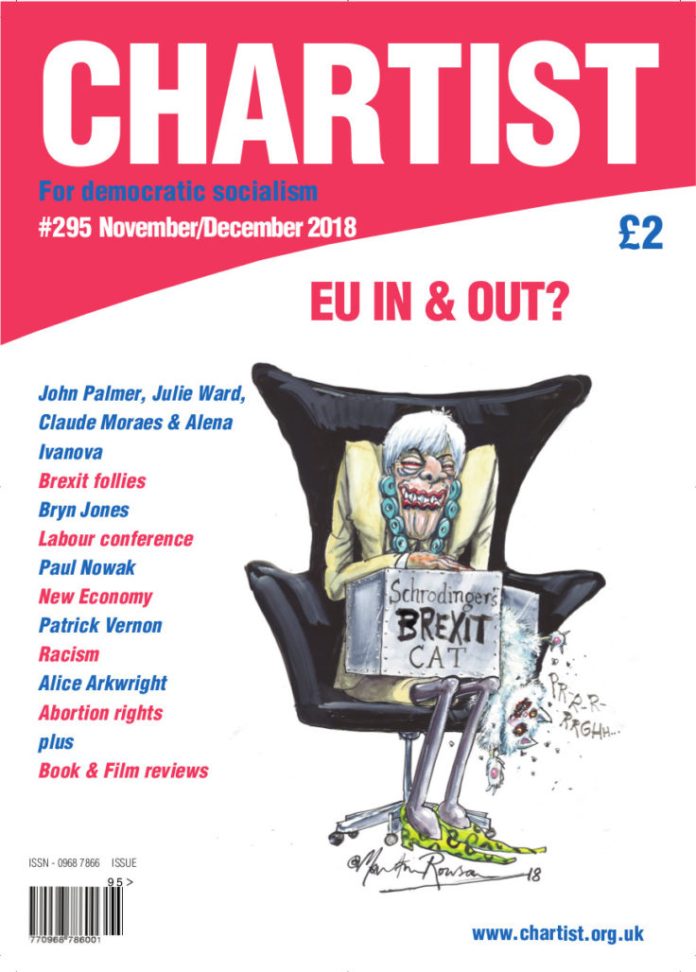
Wages stagnant for the longest period since the Napoleonic wars, a flatlining economy, low productivity growth and stagnant investment. Cap this with collapsing local council services in the face of eight years of spending cuts with a stubbornly high deficit and we can see why Theresa May announces an end to austerity. The policies have failed. People want a new direction.
But of course the government doesn’t mean end austerity now, but much later. Chancellor Hammond’s budget makes that clear. The spending squeeze continues with schools, social services, policing, under-fives provision, public housing, and regions taking the brunt. The £20bn for health is spread over several years and fails to compensate for increasing need and elderly social care. The NHS remains at break-point.
Moreover, the problems created by Tory austerity look set to get a lot worse with Brexit and the chaotic negotiations of the government, which after two and a half years has failed to even secure a withdrawal agreement, let alone a future economic relationship.
Following in the wake of Labour’s upbeat Liverpool conference, shadow chancellor John McDonnell has proposed an anti-austerity investment-led budget to deal with the grievances of Brexit-supporting voters and the left behind across the UK. Labour conference adopted a policy on Brexit that keeps the Remain option on the table and reasserts that unless the six tests for jobs, rights, the environment and the same benefits as a member state are secured the PLP must vote down any government proposal.
McDonnell pledged to boost welfare spending, scrap the iniquitous Universal Credit (see Paula Peters’ critique), reboot public services and establish a regional growth fund.
Paul Nowak of the TUC emphasises the need for a national economic plan that prioritises investment in our broken public services, an end to the precarious economy of zero hours and agency working with respect for trade union rights, family friendly hours and appropriate levels of pay. Bryn Jones reports on Labour conference highlighting McDonnell’s pledge to ensure greater democratic control by workers through a share scheme and board representation. Whilst a work in progress this is the necessary direction of travel to complement nationalisation plans. Ann Black fills out the internal democracy advances and compromises.
Meanwhile the menacing storm clouds of Brexit hang over any economic recovery programme. In a keynote feature John Palmer lays out the case for continuing to frame our political economy in a European framework. There is no national road to nirvana; the battle against neoliberalism has to be waged on a supranational platform which means remain and reform must animate a Labour alternative. Whether we are talking about ending corporate tax evasion, boosting trade and investment, research and development, combating climate change or secure employment and decent pay, the road leads through Europe.
Claude Moraes MEP shows how this is the case for security and crime fighting while Julie Ward MEP highlights the socio-cultural importance of the European Union—the most successful peace project since the Second World War. With Trump vowing to ditch the long-standing nuclear treaty with Russia while ripping up the Iran deal and banging the trade war drum the world looks a much more dangerous place.
In this context it is vital Labour has a clear defence policy. Paul Dixon puts current plans under the spotlight, finding a new pragmatism from the Corbyn camp in the tradition of Michael Foot and Neil Kinnock—previous unilateralists on nuclear weapons. Looking beyond the Trident renewal question, Dixon warms to Labour’s anti-war stance while warning about excessive defence spending commitments (2% of GDP in last Manifesto).
Elsewhere in Europe extreme-right populist and fascist currents are emerging to underline the critical importance of standing up against racism, for refugees, migrants and European free movement as Alena Ivanova argues. Patrick Vernon finds the Tories’ hostile environment manifest in the appalling treatment of the Windrush generation, amongst others, is still not resolved. Richard Kuper of Jewish Voice for Labour provides a painstaking review of Labour’s approach to tackling antisemitism and shines a way through the limitations of the IHRA definition and examples. He shows a path to strengthening our fight against all forms of racism while standing up for Palestinian rights against Israeli government oppression.
The government desperately clings on while making little or no progress on the withdrawal agreement, largely because of the Irish border issue, with May hostage to both the DUP and her hard Brexiteers. Brexit means Brexit is more likely to be the Schrodinger’s cat Brexit—neither in nor out—as John Palmer puts it, with ever-extending timelines for transition/implementation.
Meanwhile Labour must prepare for the most desirable course—a general election. May could topple any day. Labour has a clearer position on Brexit following conference. Labour’s parliamentary ranks must unite behind Starmer’s six tests and reject any deal or no deal that comes up short. The countdown to EU exit on 29th March 2019 continues relentlessly. Our manifesto must include an option to Remain and Reform whilst keeping a people’s vote on the table. Our anti-austerity stance, cast in an internationalist European perspective, has the potential to win over both disenchanted Leave voters and the vast majority of pro-EU voters. Let us keep our eye on the prize.
